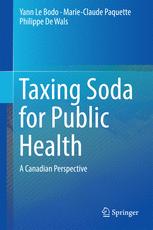

Most ebook files are in PDF format, so you can easily read them using various software such as Foxit Reader or directly on the Google Chrome browser.
Some ebook files are released by publishers in other formats such as .awz, .mobi, .epub, .fb2, etc. You may need to install specific software to read these formats on mobile/PC, such as Calibre.
Please read the tutorial at this link: https://ebookbell.com/faq
We offer FREE conversion to the popular formats you request; however, this may take some time. Therefore, right after payment, please email us, and we will try to provide the service as quickly as possible.
For some exceptional file formats or broken links (if any), please refrain from opening any disputes. Instead, email us first, and we will try to assist within a maximum of 6 hours.
EbookBell Team

4.8
54 reviewsThis timely reference analyzes the rationale, impact, and feasibility of taxation of sugar-sweetened beverages (SSBs) as a public health measure to contribute curbing obesity and diabetes rates, specifically in Canada. It presents the pros and cons of taxing soda, with the latest data on adverse health effects of its consumption, plus the various business and political issues surrounding the contentious proposition. Reviewed research is multidisciplinary, spanning health and medicine to ethics, economics, and law. Conclusions and caveats are clear and presented at a comfort level for the general reader. The result is a blueprint for analyzing the relevancy of taxes on sweetened soft drinks or other low-nutrition food products, plus a trove of valuable insights into aspects of government decision-making and consumer food behavior.
Included in the coverage:
· Reasons for specifically targeting SSBs
· SSB taxation as a public health policy instrument
· Effects of SSB taxation on energy intakes and population health
· Potential undesirable effects relating to SSB taxation· Social and political acceptability of SSB taxation
· Evaluability of SSB taxation
Taxing Soda for Public Health will interest policymakers, public health professionals, advocacy groups, and researchers at the Canadian and international levels (e.g., in areas such as public health, nutrition, food and health policies, health economics, and evaluation), as well as students and all other parties interested in nutrition policies.